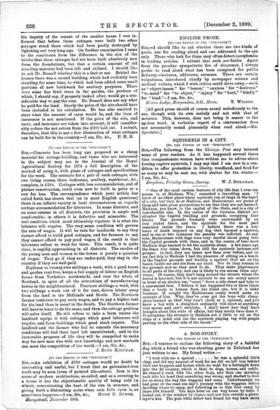[To THE EDITOR OF THE "SPECTATOR."] SIR,—Concrete has been long
ago proposed as a cheap material for cottage-building, and those who are interested in the subject may see in the Journal of the Royal Agricultural Society for 1874 a full description of the method of using it, with plans of cottages and specifications for the work. The estimate for a pair of such cottages, with two living rooms, three bedrooms, scullery, washhouse, &c., complete, is £284. Cottages with less accommodation, and of plainer construction, could even now be built in pairs or a row for less. The correspondence which your article has called forth has shown that (as in most English questions) there is an infinite variety in local circumstances as regards cottage accommodation for labourers. In some districts, and on some estates in all districts, the provision is ample and comfortable; in others it is defective and miserable. The real condition which must ultimately regulate it is what the labourer will require. The very same condition will govern the rate of wages. It will be vain for landlords to say they cannot afford to build good cottages, and for farmers to Bay they cannot afford to pay good wages, if the result is that labourers refuse to work for them. This result, it is quite clear, is rapidly approaching in all districts. The exodus of the young men and women to the towns is purely a question of wages. They go if they are under-paid, they stay in the country if they are well-paid.
Eighteen to twenty-two shillings a week, with a good house and garden rent free, keeps a full supply of labour on English farms from Yorkshire northwards, and over the whole of Scotland, in spite of all the attractions of manufacturing towns in the neighbourhood. Fourteen shillings a week, with two shillings a week out of it for rent, drives labour away from the land in the Midlands and South. The Northern farmer contrives to pay such wages, and to pay a higher rent for his land than is usual in the South. The Southern farmer will have to learn to do the same, and then the cottage problem will solve itself. He will refuse to take a farm unless the landlord equips it with cottages which good labourers will require, and farm-buildings which good stock require. The landlord and the farmer who fail to concede the necessary conditions will find their land left uncultivated ; and in the inexorable progress of life they will be compelled to make way for new men who with new knowledge and new methods can meet the competition of the world.—I am, Sir, &c,
J. BOYD KINNEAR.






















































 Previous page
Previous page